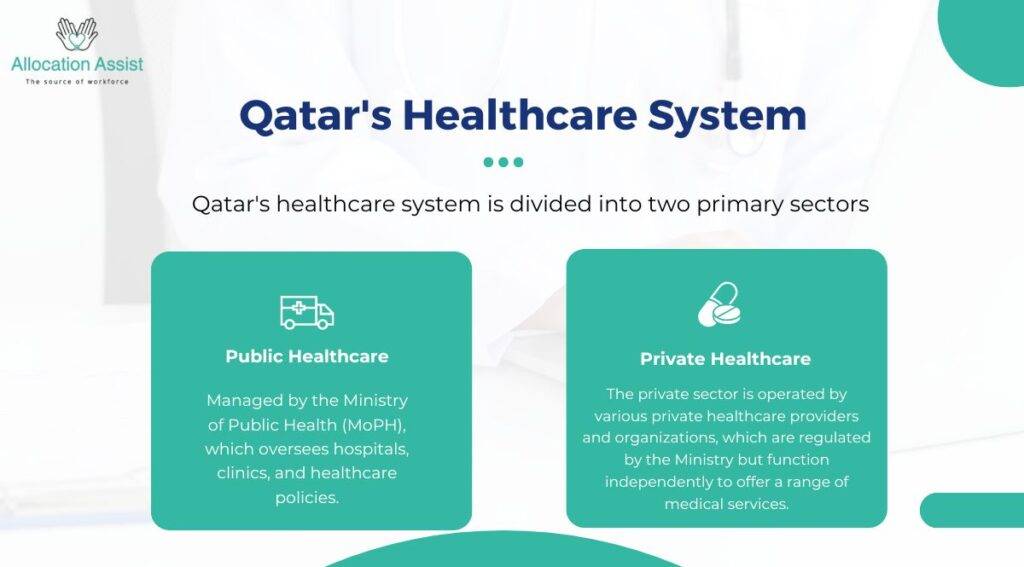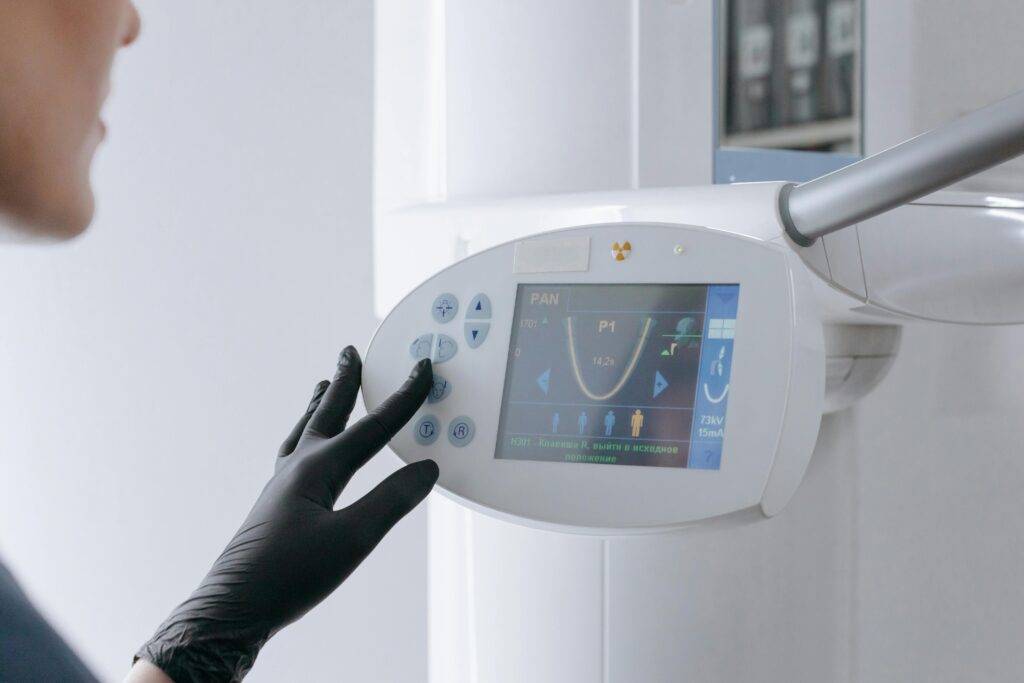Qatar’s healthcare sector has undergone significant transformation in recent years, positioning the country as a leader in healthcare innovation and quality in the Gulf region. With a focus on both public and private healthcare systems, Qatar is dedicated to providing world-class medical services to its citizens and residents. In this post, we will explore the structure, challenges, and future of Qatar’s healthcare system, ensuring a detailed understanding for readers interested in this vital sector.
Overview of Qatar’s Healthcare System

Structure of the Healthcare System
Qatar’s healthcare system is divided into two primary sectors:
Public Healthcare
The public sector in Qatar is primarily government-funded and managed by the Ministry of Public Health, featuring major facilities like Hamad Medical Corporation that provide comprehensive healthcare services. Managed by the Ministry of Public Health (MoPH), which oversees hospitals, clinics, and healthcare policies. Offers services primarily funded by the government, ensuring that essential healthcare is accessible to all residents.
Private Healthcare
The private sector is rapidly growing, offering diverse services and enhancing access to care while increasing competition within the healthcare market. It comprises numerous private hospitals and clinics that offer specialized services. Expatriates often opt for private healthcare due to shorter wait times and a broader range of services.
Key Statistics
- Healthcare Spending: Qatar’s healthcare expenditure is estimated at 2.5 billion Qatari riyals (around $688 million) annually, reflecting the country’s commitment to health improvement.
- Healthcare Professionals: Qatar boasts approximately 1.5 doctors per 1,000 people, one of the highest ratios in the region, indicating a strong healthcare workforce.
- Life Expectancy: As of 2023, life expectancy in Qatar is around 80 years, a testament to the effective healthcare system.
Public Healthcare Services
Government Hospitals and Clinics
The Hamad Medical Corporation (HMC) is Qatar’s primary public healthcare provider, operating several facilities, including:
- Hamda Medical City: This comprehensive facility offers advanced medical care, including specialized services in cardiology, oncology, and neurology, making it a pivotal healthcare hub.
- Women’s Wellness and Research Center: Focuses on women’s health issues and specialized care, providing services like maternity care, gynecological surgeries, and fertility treatments.
- Al Khor Hospital provides essential community healthcare services, including emergency care, outpatient services, and preventative health programs tailored to local needs.
Residents must obtain a Qatar Health Card to access public healthcare services, ensuring free access to essential medical care. The card is available to all residents, including expatriates, and is critical for receiving public health services.
Health Insurance for Residents
Health insurance is mandatory in Qatar. The Qatar Health Insurance Law ensures that all residents, including expatriates, have access to essential healthcare services. Basic coverage typically includes:
- Emergency Care: Critical services are required during medical emergencies.
- Hospital Admissions: Coverage for inpatient services, ensuring necessary care during hospitalization.
- Outpatient Services: Regular check-ups and consultations with healthcare providers.
For those seeking more extensive coverage, private insurance plans are available that include specialist consultations and preventive care. Understanding the specifics of health insurance options is essential for expatriates, as plans can vary significantly in terms of coverage and costs.
Private Healthcare Sector
Key Private Hospitals and Clinics
Qatar’s private healthcare sector includes several reputable hospitals and clinics, such as:
- Doha Clinic Hospital: This facility offers a wide range of medical services, including outpatient and inpatient care, with a focus on quality and patient satisfaction. It is known for its specialized departments, such as orthopedics and gastroenterology.
- Al-Ahli Hospital: Renowned for its advanced technology and specialized care, Al-Ahli Hospital provides services in various specialties, including cardiology, dermatology, and cosmetic surgery. The hospital is equipped with state-of-the-art diagnostic and treatment facilities.
- American Hospital: provides American-standard medical services with a focus on patient-centered care. The hospital features a range of services, from routine care to advanced surgical procedures, attracting a diverse patient demographic.
Private healthcare is often favored for its convenience, advanced technology, and personalized care. Many facilities offer additional services such as wellness programs, health screenings, and preventive care initiatives, contributing to overall community health.
Health Insurance in the Private Sector
Private health insurance options are diverse. Most expatriates opt for comprehensive plans that cover:
- Inpatient and Outpatient Services: Ensuring coverage for hospital stays and regular medical visits.
- Specialist Consultations: Access to specialists across various fields, enhancing patient care options.
- Preventive Care and Wellness Checks: Regular screenings and check-ups to maintain health and prevent illness.
Selecting a health insurance plan that aligns with individual needs is crucial for ensuring access to preferred healthcare providers. Expatriates are advised to compare different plans and read the fine print to understand exclusions and limitations.
Licensing and Registration for Medical Professionals
Obtaining a Medical License in Qatar
To practice in Qatar, foreign medical professionals must obtain a medical license through the Qatar Council for Healthcare Practitioners (QCHP). The licensing process includes:
- Verification of Qualifications: All medical degrees and training must be verified by the QCHP, which includes contacting educational institutions and reviewing credentials.
- Passing the Licensing Exam: Applicants must demonstrate their medical knowledge and clinical skills by passing a licensing exam. Preparation resources and study materials are often available through the QCHP.
- Submitting Required Documents: Essential documentation includes:
- Valid passport
- Medical degree and transcripts
- Proof of relevant work experience
- Letters of recommendation
Medical professionals must first be licensed and then register with the Ministry of Public Health. This registration involves the following:
- Continuing Education Requirements: regularly updating skills and knowledge through courses and training to maintain licensure.
- Professional Development Activities: Participation in local medical associations’ training programs, conferences, and workshops to enhance professional skills and network with peers.
Job Opportunities for Doctors
Demand for Healthcare Professionals
The demand for healthcare specialists in Qatar is increasing significantly due to a rapidly growing population, projected to reach 2.5 million by 2030. The Qatar National Vision 2030 prioritizes enhancing healthcare infrastructure, driving the need for specialists in areas like cardiology, pediatrics, and emergency medicine.
The Qatar Council for Healthcare Practitioners (QCHP) reports an expected 30% expansion in the healthcare workforce in the coming years, creating thousands of new jobs for doctors in Qatar.
Working Conditions
Competitive Salaries and Benefits
Salaries for doctors in Qatar are highly competitive and often tax-free, making the country an attractive destination for expatriates seeking to enhance their financial stability. Compensation packages vary based on several factors, including:
- Experience: More seasoned professionals typically command higher salaries, reflecting their expertise and the value they bring to healthcare settings.
- Specialization: Physicians specializing in high-demand fields, such as cardiology, orthopedics, or emergency medicine, may receive significantly higher compensation due to their specialized skills.
- Type of Facility: Salaries can differ between public and private institutions, with private facilities often offering higher pay to attract top talent.
Qatar offers attractive salaries and benefits for doctors, making it a desirable destination for medical professionals. Physicians in Qatar typically earn competitive salaries that range from QAR 50,000 to QAR 90,000 per month, depending on their specialty and experience.
Employee Benefits in Qatar
In addition to competitive salaries, doctors in Qatar can expect a range of attractive benefits, including:
- Health Insurance: Comprehensive health insurance is typically provided for the doctor and their immediate family, covering a range of medical services.
- Housing Allowances: Many employers offer housing allowances or accommodations to help ease the transition and living expenses, which can significantly reduce financial stress.
- Annual Leave: Generous annual leave policies allow for rest and recuperation, with many contracts including return airfare to the doctor’s home country, supporting family connections and personal well-being.
- Professional Development: Opportunities for continuous education and professional training, including sponsorship for attending international conferences and workshops, are often included to encourage career growth.
Work Environment in Qatar Hospital
Modern Facilities
Hospitals and clinics in Qatar are equipped with state-of-the-art technology, enabling advanced diagnostics and treatment options. Features of the work environment include:
- Cutting-Edge Equipment: Access to the latest medical technologies enhances diagnostic accuracy and treatment efficacy, allowing healthcare professionals to provide high-quality care.
- Collaborative Atmosphere: The working environment is generally collaborative, with multidisciplinary teams engaging in shared decision-making. This approach fosters a supportive culture where different healthcare professionals can exchange knowledge and expertise.
Cultural Diversity
The healthcare workforce in Qatar is notably multicultural, with professionals hailing from various countries and cultural backgrounds. This diversity brings unique challenges and opportunities:
- Adaptability: Doctors must be adaptable and culturally sensitive when interacting with patients from diverse backgrounds, understanding different customs and healthcare practices.
- Enhanced Patient Care: This multicultural environment can lead to improved patient care, as diverse teams are often better equipped to understand and address the varied needs of a broad patient demographic.
Related Articles:
Key Areas of Focus in Healthcare Opportunities

Children’s Healthcare
Qatar emphasizes comprehensive pediatric care, addressing a range of needs from general health to specialized services in developmental and behavioral health. The focus includes:
- Preventive Care: Regular check-ups and vaccinations are part of an extensive pediatric health program aimed at promoting overall child health and well-being.
- Interdisciplinary Care: Collaboration among pediatricians, child psychologists, and nutritionists ensures holistic treatment approaches for young patients.
Mental Health Services
Mental health has gained prominence in Qatar, with increased funding and awareness leading to a demand for professionals in this field. Key aspects include:
- Expanded Services: A variety of mental health services are being developed, including counseling, therapy, and community support programs aimed at reducing stigma and increasing access to care.
- Research and Training: Ongoing research and training initiatives focus on improving mental health services and outcomes, creating a need for skilled professionals in this evolving area.
Women’s Health
There is a strong emphasis on women’s health services, covering areas such as:
- Reproductive Health: Comprehensive reproductive health services, including family planning, prenatal care, and infertility treatments, are widely available.
- Maternal Care: Focused programs aim to provide quality care throughout pregnancy, childbirth, and postpartum, addressing both physical and emotional health.
Emerging Trends in Healthcare
Telemedicine
The rise of telehealth services in Qatar offers doctors the opportunity to provide care remotely. Benefits include:
- Increased Access: Patients can receive care more conveniently, which is particularly beneficial for those in remote areas or with mobility challenges.
- Efficiency: Telemedicine reduces the burden on physical facilities, allowing healthcare providers to manage their time and resources more effectively.
Research and Development
Qatar is prioritizing healthcare research as part of its National Vision 2030, creating opportunities for doctors to engage in innovative projects. Key points include:
- Collaborative Research: Opportunities for collaboration with local and international research institutions enhance professional development and contribute to advancing medical knowledge.
- Funding Initiatives: Increased funding for healthcare research fosters an environment of innovation, enabling healthcare professionals to explore new treatments and technologies.
Cultural Considerations
Understanding Patient Demographics
Qatar is home to a diverse population, with expatriates making up about 88% of the workforce. This demographic diversity presents unique challenges and opportunities for healthcare providers. Understanding cultural backgrounds is essential for effective communication and patient care.
Communication and Etiquette
Effective communication in healthcare settings is critical. Here are some key tips:
- Use Simple Language: When speaking with patients, avoid using complex medical terminology. Clear communication builds trust and understanding.
- Show Respect for Cultural Norms: Learn about cultural customs and practices, particularly in the healthcare setting. This includes learning about modesty practices and gender preferences in care.
- Be Patient and Empathetic: Take the time to listen to patients’ concerns and questions, ensuring they feel valued and understood.
Conclusion
Understanding Qatar’s healthcare system is crucial for medical professionals looking to build a career in the country. With a blend of public and private services, a strong emphasis on health insurance, and numerous growth opportunities, Qatar offers a vibrant environment for healthcare professionals. Embrace the challenges and opportunities, and you will find a rewarding experience in this rapidly growing healthcare landscape.
Additional Resources
- Qatar Ministry of Public Health
- Qatar Council for Healthcare Practitioners
- Hamad Medical Corporation
- Qatar National Vision 2030
FAQs About Qatar’s Healthcare System
Qatar has a mixed healthcare system, combining public and private services, with high-quality care overseen by the Ministry of Public Health.
Yes, Qatari citizens receive free healthcare services through the public healthcare system, including hospitals and clinics.
Qatar ranks 17th place in 2024 among the top healthcare systems globally, known for its advanced facilities and quality of care.
Medical doctors in Qatar typically earn between QAR 5,000 and QAR 90,000 per month.
Yes, doctors in Qatar enjoy competitive salaries, often higher than in many other countries, and attractive benefits.
Qatar offers excellent earning potential with no income tax, making it a financially attractive destination.
Foreign doctors must obtain a license from the Qatar Council for Healthcare Practitioners (QCHP), which involves credential verification and a licensing exam.
Salaries for doctors in Qatar range from QAR 20,000 to QAR 50,000 per month, depending on experience and specialty.
Doctors must obtain a license from the Qatar Council for Healthcare Practitioners (QCHP) and provide verified credentials and exam results.
Salaries for doctors in Qatar are competitive and often tax-free, with additional benefits like housing allowances and health insurance.
Doctors must obtain a license from the Qatar Council for Healthcare Practitioners (QCHP) and provide verified credentials and exam results.


